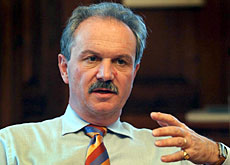Greenspan effect did much for Switzerland

Switzerland has reason to thank the departing United States Federal Reserve chairman, Alan Greenspan, as he hands over the reigns after 18 years in the job.
Swiss homeowners – the most heavily indebted in the world – have benefited particularly from Greenspan’s achievement in bringing down the long-term cost of debt.
Greenspan, 79, is revered in the US and beyond for keeping the American economy, and indirectly the world economy, stable and out of recession.
Among economists he has the status of an oracle – albeit a cryptic one – for what Janwillem Acket, chief economist at Bank Julius Bär, describes as his “superb handling” of stock market crashes and financial crises.
The ability to set interest rates in the world’s largest economy gave Greenspan enormous influence over the rest of the world. (On Tuesday, the Federal Reserve raised its prime interest rate by a quarter of a per cent to 4.50 per cent.)
His two primary achievements, according to Acket, were to boost liquidity during times of crisis (economist-speak for making sure people could still afford to borrow money), and to reduce the long-term cost of borrowing.
Debts
Acket told swissinfo that Greenspan’s latter accomplishment had had a direct effect on Switzerland which, thanks to the tax system, has the highest mortgage debt per capita of any country in the OECD (Organisation for Economic Cooperation and Development).
“Only 30 per cent of the Swiss own their own home, but they are the most indebted homeowners in the world, and the historically low cost of mortgage debt in Switzerland can be attributed to Greenspan’s policies,” said Acket.
Greenspan became a household name outside the US during the stock market crash of 2002, when he averted a full-blown recession by slashing US interest rates.
But among economists he proved himself just months into the job, taking over on the eve of the 1987 stock market crash.
Unlike his predecessors in the 1930s, who aggravated the 1929 crash turning it into the great depression, Greenspan flooded the economy with cheap money after 1987, turning the worst crash in history – in absolute terms – into a short-lived dip on fund managers’ charts.
Manipulation
Greenspan’s strategy of alleviating the consequences of market crashes through the skilful manipulation of interest rates brought stability to the US and, by extension, to the world economy, earning him plaudits across Europe.
“He masterfully combined the internal goals of the Federal Reserve with an eye on the world economy,” Rudolf Walser, chief economist of the Swiss Business Federation, economiesuisse, told swissinfo.
“The financial sector in Switzerland followed his every statement systematically. The real economy sector – pharma, tourism, industry – relies on a stable world economy and avoiding turbulence in the exchange markets.”
Acket of Julius Bär said Greenspan managed the extremely difficult balancing act of providing the “right amount of liquidity [money] to the economy at the right time”.
Greenspan’s inflation record is equally highly regarded. “He made [interest rate] policy more flexible when necessary,” said Walser, “and kept the US inflation rate under control.
“He also stepped on the brake at the right moment one and a half years ago to stop the US economy from overheating.”
Criticism
Criticism of Greenspan – chiefly for not popping the dotcom bubble – doesn’t find much resonance in Switzerland.
“Even people like Greenspan are not infallible,” said Walser. “With hindsight you can criticise this or that but Switzerland has no reason to complain about his decisions in general.”
Both Acket and Walser are upbeat about Greenspan’s successor, Ben Bernanke, who is regarded as a straight talker.
“He’ll be less of an oracle,” says Acket, while Walser predicts an easier time for analysts who were “kept up all night trying to decipher his cryptic comments”.
swissinfo
Alan Greenspan was appointed Chairman of the Board of Governors of the Federal Reserve on August, 11, 1987.
He has been credited for keeping US inflation under control and for restoring stability after the 1987 market crash.
He has been criticised for refusing to burst the dotcom bubble, and for allowing the US housing market to overheat.
Just 30% of Swiss own their own homes, but per capita mortgage debt is the highest in the world.
Switzerland’s tax system allows homeowners to deduct the entire cost of their mortgage debt from their tax bill.
Swiss mortgage rates are at historically low levels because the cost of borrowing has declined significantly during Greenspan’s tenure.

In compliance with the JTI standards
More: SWI swissinfo.ch certified by the Journalism Trust Initiative



You can find an overview of ongoing debates with our journalists here. Please join us!
If you want to start a conversation about a topic raised in this article or want to report factual errors, email us at english@swissinfo.ch.